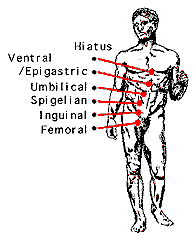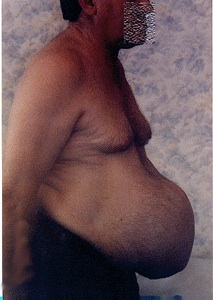Quick Answers to the 25 Most Frequently Asked Questions…
(In no particular order)
1 Is it dangerous to ignore the hernia?
Most hernias, if not treated, do nothing more than get bigger. However, hernias can get very painful, often without warning and at their worst can strangulate, which can demand an ambulance and immediate emergency surgery or the consequences could be extreme.
2 What is a Strangulated Hernia?
If the window in the abdominal wall should decide to close and clamp shut whilst a fold of bowel (for example) is poking through it, this is a strangulated hernia. It cuts off the blood supply to the bowel which rapidly turns very unpleasant. It is usually extremely painful and is a surgical emergency. Sometimes it can require treatment within minutes, requiring an ambulance trip to the emergency room at the nearest hospital.
If you have pain with a hernia, especially a small one, you should not wait to see what happens. Get it repaired as soon as possible.
See the important section on Strangulated Hernia.
3 My local hospital/doctor/surgeon says they do the same operation. If that is the case, why do I need to come to you?
Not many of them really do, but if your local hospital really does do the same operation – and by a dedicated, highly expereinced team specialising in hernia who are achieving – and publishing – the same results, you can use either of us. Not all hernia operations are the same, unfortunately, nor are the outcomes, so choose wisely.
The next Question will help you…
4 How can I know if hernia surgery provided at my local hospital really is the same as at The British Hernia Centre?
The easiest way to compare is to start with these simple questions. For example,
- How many tens of thousands of hernia cases has your surgeon and his team performed? (Always ask that question)
- Is it done routinely under just local anaesthesia?
- Will you need overnight hospital admission at all?
- Will you be able to return to work and normal activities in the same amount of time?
- Are the risks of recurrence anything like the same?
- Do they have a 100% safety record and ZERO MRSA?
5 Is there any advantage to being treated at a specialist hernia centre?
Hernia surgery is no different to any other walk of life in this regard. If other operations are done better by people who specialise in that work, then hernia is no different. Expert opinion now recognises the importance of specialisation in hernia, not only by the surgeon, but the rest of the team and the unit where the work is done.
Our own results have been improved on because of our experience with so many cases each year. We started off with excellent results, but by doing tens of thousands of hernias, even they were dramatically improved upon. See Value of Specialisation.
6 My Family Doctor says: “If it doesn’t hurt you, just leave it alone and see what happens.” Is this really good advice?
We would not seek to contradict any doctor, but we are increasingly coming to the view that this can be very bad advice.
As hernia specialists, we know that hernias only tend to get worse and every day we leave them untreated, we run the risks of complications setting in as well as facing a larger operation eventually.
The only advice that should be given once a hernia is diagnosed is to get it repaired as soon as possible.
Many of the giant, even inoperable, hernias we see started off being ignored due to well-meaning advice by their GP.
Apart from the risks of strangulation, hernias can just get bigger and bigger.
This hernia (see photo) started off as a small bulge by his navel. It did not hurt him and he decided to accept the common yet mistaken belief that there was no reason to undergo surgery yet.
Of course as it became larger he still chose to put off dealing with it until it reached this stage, which was really not at all sensible. Sadly we see cases like this all the time.
This is pretty graphic evidence why we feel that the only advice that should be given once a hernia is diagnosed is to get it repaired as soon as possible.
7 I’m pregnant. Should I fix the hernia before the baby is born?

Probably not, but click here for important and helpful information on Pregnancy & Hernia.
8 I do not have a bulge and my doctor does not know if this is a hernia or not. How can I be sure?
The bulge is a very common symptom of hernia, but not all hernias have bulges…and not all groin pain is hernia.
To find out with more certainty in cases that are difficult to distinguish, you should be seen by a hernia specialist. For more information on confusing cases of groin injury click the link to Sport, Groin Pain and Hernia.
9 I had my hernia repaired somewhere else. How long before I can do things again?
Everybody repairs hernias differently and with different levels of expertise. The results are very widely varied. Although our patients are able to do whatever they like as soon as they like, elsewhere it can take weeks or months to get back to normal. We cannot tell you what to expect, only the surgeon who did it can. Check the link to Why Specialise?
10 What are the symptoms of a hernia – Is what I have found a hernia?
Unless you are a doctor, do not try self-diagnosis. The reasons are many, including that there are several possible symptoms (some, none or any mixture of) which you may have and may detect. However, what you have might be something else entirely and by thinking (perhaps incorrectly) that you can diagnose it as a hernia, you may be putting something else at great risk of going untreated.
If you have symptoms indicating something is not right, then see a doctor who can diagnose it for you properly. We do not recommend any other course as sensible.
11 I heard that Keyhole surgery is the best technique available. Do you agree?
Keyhole (laparoscopic) surgery represents a great advance in many areas of surgery, such as ovaries, throats, knees, etc.
For hernia though, we find that results that are as good, or better, can be achieved without the risks of keyhole surgery (except in certain specific cases).
Furthermore, our preferred approach does not need general anaesthesia. Keyhole surgery can only be done with general anaesthesia or spinal injections, which carry additional risks.
We stress that different ideas and beliefs by surgeons are healthy in order to make the changes that lead to advances and improvements. Although there are some eminent proponents of keyhole hernia repair, we do more of these tension-free hernia repairs than any hospital in the entire world, so we could use any technique known to surgical science. Our conclusions are therefore based upon very significant experience.
We DO offer laparoscopy, but in very specific cases where we find that to be more appropriate than the open repair we describe.
See Methods of Repair.
12 Can a hernia affect erections?
Uncomfortable or painful hernias have been known to cause such problems, because erectile function is very easily interfered with and if one gets any kind of pain with erection, the self-defence mechanism kicks in and prevents the pain by reducing the erection. It can be as simple as that.
This should get back to normal as soon as the underlying cause, namely the hernia, is dealt with. However, if the situation is allowed to continue for a long time, return to normal erectile function might not be quite so simple.
13 I am a lady in my eighties. My doctor tells me I am too old for hernia surgery but my hernia is so large, it makes me look pregnant and am too embarrassed to leave my home. Can anything be done?
 Almost certainly it can. Until now, much about hernia surgery has been quite dangerous in the elderly, or for patients with other complications.
Almost certainly it can. Until now, much about hernia surgery has been quite dangerous in the elderly, or for patients with other complications.
The operations we now do are perfectly suitable for most such patients and you can be rid of the hernia problems very easily.
We see patients much older than you.
Click here for more on who is suited to surgery
14 What is a Spigelian Hernia?
We repair these hernias in almost exactly the same way as we repair the others, with a tension-free reinforcement. The operation is safer, the recovery is much faster and the long-term outcome better.
Once the diagnosis has been confirmed one should have the surgery and, if possible, by a hernia specialist who uses this modern technique routinely.
15 My child has a hernia. What needs to be done about it and who do I need to see?
Paediatric hernia must never be ignored. Things happen much faster in children and delay in treating a child’s hernia that may need treatment (not all of them do) could cause harm now and damage the child’s development.
See full details at Paediatric hernia
16 It doesn’t hurt me at all. Do I really have to get my hernia repaired?
Yes! There are many reasons why. Hernias (in adult life) do not repair themselves. In fact, they normally only get worse. Every day you leave your hernia, it gets slightly bigger, you are a day older, and the tissue just a little less ‘co-operative’. All you are doing is putting off treatment and could be suffering symptoms while you do so. The obvious problems include pain, enlargement and at worst, strangulation (sometimes without warning).
Once diagnosed, abdominal wall hernias should be repaired as soon as possible and by the best techniques available.
17 Is there any way I can prevent myself from getting a hernia?
No. It is unfortunately something that can afflict anyone. About one in ten of us will have one, which is an awfully large number.
18 I had a hernia repaired and it has come back (recurred). Can’t it be fixed once and for all?
Traditionally (using previous techniques) many hernia repairs fail (recur) and they tend to fare even worse when they get repaired again. The failure rate is thought to double with each subsequent attempt.
Happily we now have a proven technique which is so reliable that even hernias which have recurred and recurred several times over are as reliable as primary (first time) repairs. The risks of recurrence are an insignificant fraction of one percent.
See the page specifically on Recurrent Hernia.
19 Is there a link between Hernia and Testicles?
Yes. But it may not be what you think. Click to see the section on the page covering Testicular Involvement.
20 Are hernias hereditary?
No. We all inherit an anatomical weakness as part of the design of the human body and are thus susceptible to hernias.
21 Are hernias normally repaired by hernia specialists?
Most hernias around the world are repaired by general surgeons as just one of the list of procedures they perform. Hernia is not a subject that has attracted enough interest generally to make it a specialised area. The slow development of modern hernia techniques is a result. We feel that hernia needs specialisation.
22 If I am Self-Paying, what are the costs?
This depends upon a few variables. We repair just about every kind of hernia there is and we see patients who range from the peak of fitness and good health to really elderly and sometimes infirm patients. Some hernias are straight-forward, primary (first time) repairs, others are recurrences of repairs done elsewhere. Some are single, some are double hernias (or even more!) – and so forth. Typically the total costs are surprisingly affordable, but we need to know about the case to give an accurate guide. Try that form on the Contact Us Page. There is one for Abdominal Wall Hernia, another for Hiatus Hernia. That gives us the most important information about your case and we get back to you with our recommendations and a guide of the costs.
Not everything that is excellent is expensive and you may be very pleasantly surprised at how affordable it is.
23 My Insurance, HMO or National Health Service may not cover me to have this specialised treatment. What should I do?
If you are in this position, you must still remember that it is your body and your health at stake. If you feel that you can get something you vastly prefer to what they make available to you, then go for it yourself.
See the previous answer. As we say, not everything that is excellent is expensive and you may be very pleasantly surprised at how affordable it is.
24 I am planning a holiday in xxxxxx. My hernia is not really troublesome but I am worried something might happen away from home. What should I do?
Do NOT go on any kind of active holiday or travel anywhere far from good surgical care with a known hernia condition. You are at risk AND may well find yourself uninsured under the terms of your travel insurance. See the page on Holidays with known hernias.
25 If I want to see you, can you see me quickly?
Most certainly. Hernias need to be seen as early as possible and we would work around the clock to ensure we have no long waiting lists. Depending upon workload, we can see patients within days, commonly within two weeks and rarely more than 3 weeks after contacting us. For appointments, just call us. See the Contact Us page for everything you need.
There is, of course, much more detail on the actual pages themselves on this site. Feel free to read whichever pages interest you for more information.
Next: About Us

